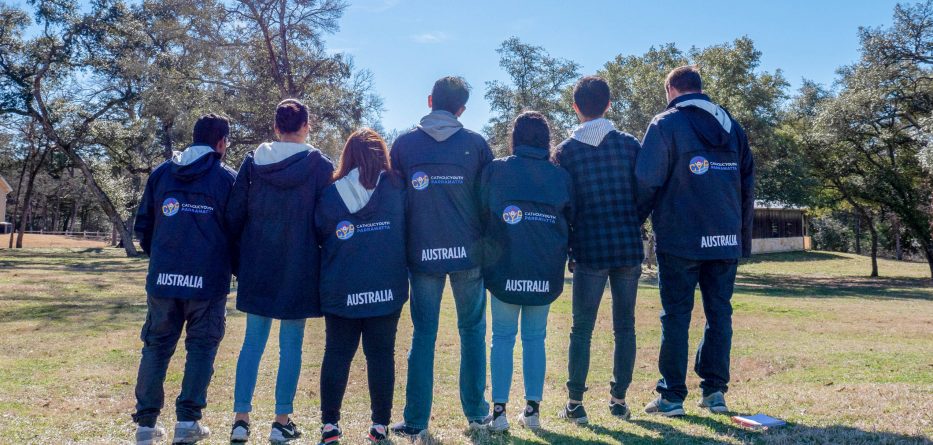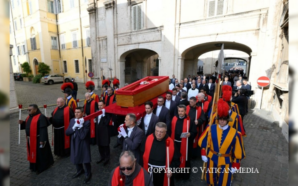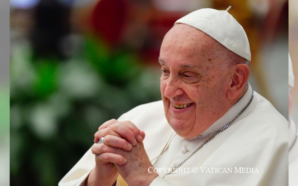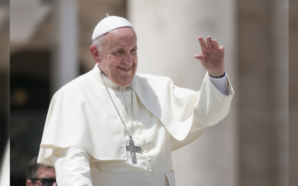Post-Synodal Apostolic Exhortation
CHRISTUS VIVIT
of the Holy Father
FRANCIS
to Young People and to the entire People of God
1. CHRIST IS ALIVE! He is our hope, and in a wonderful way he brings youth to our world. The very first words, then, that I would like to say to every young Christian are these: Christ is alive and he wants you to be alive!
2. He is in you, he is with you and he never abandons you. However far you may wander, he is always there, the Risen One. He calls you and he waits for you to return to him and start over again. When you feel you are growing old out of sorrow, resentment or fear, doubt or failure, he will always be there to restore your strength and your hope.
3. With great affection, I address this Apostolic Exhortation to all Christian young people. It is meant to remind you of certain convictions born of our faith, and at the same time to encourage you to grow in holiness and in commitment to your personal vocation. But since it is also part of a synodal process, I am also addressing this message to the entire People of God, pastors and faithful alike, since all of us are challenged and urged to reflect both on the young and for the young. Consequently, I will speak to young people directly in some places, while in others I will propose some more general considerations for the Church’s discernment.
4. I have let myself be inspired by the wealth of reflections and conversations that emerged from last year’s Synod. I cannot include all those contributions here, but you can read them in the Final Document. In writing this letter, though, I have attempted to summarize those proposals I considered most significant. In this way, my words will echo the myriad voices of believers the world over who made their opinions known to the Synod. Those young people who are not believers, yet wished to share their thoughts, also raised issues that led me to ask new questions.
CHAPTER SIX
Young people with roots
179. I have sometimes seen young and beautiful trees, their branches reaching to the sky, pushing ever higher, and they seemed a song of hope. Later, following a storm, I would find them fallen and lifeless. They lacked deep roots. They spread their branches without being firmly planted, and so they fell as soon as nature unleashed her power. That is why it pains me to see young people sometimes being encouraged to build a future without roots, as if the world were just starting now. For “it is impossible for us to grow unless we have strong roots to support us and to keep us firmly grounded. It is easy to drift off, when there is nothing to clutch onto, to hold onto”.98 (98 Address at the Vigil, XXIV World Youth Day in Panama, (26 January 2019): L’Osservatore Romano, 28-29 January 2019, 6.)
Don’t allow yourselves to be uprooted
180. This is an important issue, and I want to spend a brief chapter discussing it. If we appreciate this issue, we can distinguish the joy of youth from a false cult of youth that can be used to seduce and manipulate young people.
181. Think about it: if someone tells young people to ignore their history, to reject the experiences of their elders, to look down on the past and to look forward to a future that he holds out, doesn’t it then become easy to draw them along so that they only do what he tells them? He needs the young to be shallow, uprooted and distrustful, so that they can trust only in his promises and act according to his plans. That is how various ideologies operate: they destroy (or deconstruct) all differences so that they can reign unopposed. To do so, however, they need young people who have no use for history, who spurn the spiritual and human riches inherited from past generations, and are ignorant of everything that came before them.
182. These masters of manipulation also use another tactic: the cult of youth, which dismisses all that is not young as contemptible and outmoded. The youthful body becomes the symbol of this new cult; everything associated with that body is idolized and lusted after, while whatever is not young is despised. But this cult of youth is simply an expedient that ultimately proves degrading to the young; it strips them of any real value and uses them for personal, financial or political profit.
183. Dear young friends, do not let them exploit your youth to promote a shallow life that confuses beauty with appearances. Realize that there is beauty in the labourer who returns home grimy and unkempt, but with the joy of having earned food for his family. There is extraordinary beauty in the fellowship of a family at table, generously sharing what food it has. There is beauty in the wife, slightly dishevelled and no longer young, who continues to care for her sick husband despite her own failing health. Long after the springtime of their courtship has passed, there is beauty in the fidelity of those couples who still love one another in the autumn of life, those elderly people who still hold hands as they walk. There is also a beauty, unrelated to appearances or fashionable dress, in all those men and women who pursue their personal vocation with love, in selfless service of community or nation, in the hard work of building a happy family, in the selfless and demanding effort to advance social harmony. To find, to disclose and to highlight this beauty, which is like that of Christ on the cross, is to lay the foundations of genuine social solidarity and the culture of encounter.
184. Along with the stratagems of a false cult of youth and appearance, we are also witnessing attempts to promote a spirituality without God, an affectivity without community or concern for those who suffer, a fear of the poor, viewed as dangerous, and a variety of claims to offer a future paradise that nonetheless seems increasingly distant. I do not want to offer you any such thing, and with great love I urge you not to let yourselves be taken in by this ideology. It will not make you any younger, but enslave you instead. I propose another way, one born of freedom, enthusiasm, creativity and new horizons, while at the same time cultivating the roots that nourish and sustain us.
185. In this regard, I would note that “many Synod Fathers coming from non-Western contexts pointed out that in their countries globalization is bringing with it forms of cultural colonization that sever young people from their cultural and religious roots. The Church needs to make a commitment to accompanying these young people, so that in the process they do not lose sight of the most precious features of their identity”.99 (99 FD 14.)
186. Today, in fact, we see a tendency to “homogenize” young people, blurring what is distinctive about their origins and backgrounds, and turning them into a new line of malleable goods. This produces a cultural devastation that is just as serious as the disappearance of species of animals and plants.100 (100 Cf. Encyclical Letter Laudato Si’ (24 May 2015), 145: AAS 107 (2015), 906.) For this reason, in addressing young indigenous people gathered in Panama, I encouraged them to “care for your roots, because from the roots comes the strength that is going to make you grow, flourish and bear fruit”.101 (101 Video Messsage for the World Meeting of Indigenous Youth in Panama (17-21 January 2019): L’Osservatore Romano, 19 January 2019, 8.)
Your relationship with the elderly
187. At the Synod, we heard that “the young are focused on the future and they face life with energy and dynamism. But they are also tempted… to give little attention to the memory of the past from which they come, in particular the many gifts transmitted to them by their parents, their grandparents and the cultural experience of the society in which they live. Helping the young to discover the living richness of the past, to treasure its memory and to make use of it for their choices and opportunities, is a genuine act of love towards them, for the sake of their growth and the decisions they are called to make”.102 (102 FD 35.)
188. The word of God encourages us to remain close to the elderly, so that we can benefit from their experience: “Stand in the assembly of the elders. Who is wise? Cling to him… If you see an intelligent man, visit him; let your foot wear out his doorstep” (Sir 6:34.36). In any case, the long years they lived and all they have experienced in life should make us look to them with respect: “You shall rise up before the hoary head” (Lev 19:32). For “the glory of young men is their strength, but the beauty of old men is their grey hair” (Prov 20:29).
189. The Bible also tells us: “Listen to your father who begot you, and do not despise your mother when she is old” (Prov 23:22). The command to honour our father and mother “is the first commandment to carry a promise with it” (Eph 6:2, cf. Ex 20:12; Deut 5:16; Lev 19:3), and that promise is: “that it may be well with you and that you may live long on the earth” (Eph 6:3).
190. This does not mean having to agree with everything adults say or approving all their actions. A young person should always have a critical spirit. Saint Basil the Great encouraged the young to esteem the classical Greek authors, but to accept only whatever good they could teach.103 (103 Cf. Ad Adolescentes, I, 2: PG 31, 566.) It is really a matter of being open to receiving a wisdom passed down from generation to generation, a wisdom familiar with human weakness and not deserving to vanish before the novelties of consumer society and the market.
191. The world has never benefitted, nor will it ever benefit, from a rupture between generations. That is the siren song of a future without roots and origins. It is the lie that would have you believe that only what is new is good and beautiful. When intergenerational relationships exist, a collective memory is present in communities, as each generation takes up the teachings of its predecessors and in turn bequeaths a legacy to its successors. In this way, they provide frames of reference for firmly establishing a new society. As the old saying goes: “If the young had knowledge and the old strength, there would be nothing they could not accomplish”.
Dreams and visions
192. The prophecy of Joel contains a verse that expresses this nicely: “I will pour out my Spirit upon all flesh, and your sons and your daughters shall prophesy, and your young men shall see visions, and your old men shall dream dreams” (3:1; cf. Acts 2:17). When young and old alike are open to the Holy Spirit, they make a wonderful combination. The old dream dreams, and the young see visions. How do the two complement one another?
193. The elderly have dreams built up of memories and images that bear the mark of their long experience. If young people sink roots in those dreams, they can peer into the future; they can have visions that broaden their horizons and show them new paths. But if the elderly do not dream, young people lose clear sight of the horizon.
194. Perhaps our parents have preserved a memory that can help us imagine the dream our grandparents dreamed for us. All of us, even before our birth, received, as a blessing from our grandparents, a dream filled with love and hope, the dream of a better life. Even if not our grandparents, surely some of our great-grandparents had that happy dream as they contemplated their children and then grandchildren in the cradle. The very first dream of all is the creative dream of God our Father, which precedes and accompanies the lives of all his children. The memory of this blessing that extends from generation to generation is a precious legacy that we should keep alive so that we too can pass it on.
195. That is why it is a good thing to let older people to tell their long stories, which sometimes seem legendary or fanciful – they are the dreams of old people – yet are often full of rich experiences, of eloquent symbols, of hidden messages. These stories take time to tell, and we should be prepared to listen patiently and let them sink in, even though they are much longer than what we are used to in the social media. We have to realize that the wisdom needed for life bursts the confines of our present-day media resources.
196. In the book Sharing the Wisdom of Time,104 (104 Cf. POPE FRANCIS AND FRIENDS, Sharing the Wisdom of Time, Chicago, Loyola Press, 2018.) I expressed some thoughts in the form of questions. “What do I ask of the elders among whom I count myself? I call us to be memory keepers. We grandfathers and grandmothers need to form a choir. I envision elders as a permanent choir of a great spiritual sanctuary, where prayers of supplication and songs of praise support the larger community that works and struggles in the field of life”.105 (105 Ibid., 12.) It is a beautiful thing when “young men and maidens together, old men and children, praise the name of the Lord” (Ps 148:12-13).
197. What can we elderly persons give to the young? “We can remind today’s young people, who have their own blend of heroic ambitions and insecurities, that a life without love is an arid life”.106 (106 Ibid., 13.) What can we tell them? “We can tell fearful young people say that anxiety about the future can be overcome”.107 (107 Ibid.) What can we teach them? “We can teach those young people, sometimes so focused on themselves, that there is more joy in giving than in receiving, and that love is not only shown in words, but also in actions”.108 (108 Ibid.)
Taking risks together
198. A love that is generous and outgoing, that acts and takes risks, may at times make mistakes. Here we may find timely the witness of Maria Gabriella Perin, who lost her father shortly after her birth: she reflects on how this influenced her life, in a relationship that did not last but that left her a mother and now a grandmother. “What I know is that God makes stories. In his genius and mercy, he takes our triumphs and our failures and weaves beautiful tapestries that are full of irony. The reverse of the fabric may look messy with its tangled threads – the events of our life – and maybe this is the side we dwell on when we doubt. But the right side of the tapestry displays a magnificent story, and this is the side that God sees”.109 (109 Ibid., 162.) When older people look at life closely, often they instinctively know what lies behind the tangled threads, and they recognize what God can create even out of our mistakes.
199. If we journey together, young and old, we can be firmly rooted in the present, and from here, revisit the past and look to the future. To revisit the past in order to learn from history and heal old wounds that at times still trouble us. To look to the future in order to nourish our enthusiasm, cause dreams to emerge, awaken prophecies and enable hope to blossom. Together, we can learn from one another, warm hearts, inspire minds with the light of the Gospel, and lend new strength to our hands.
200. Roots are not anchors chaining us to past times and preventing us from facing the present and creating something new. Instead, they are a fixed point from which we can grow and meet new challenges. It does us no good “to sit down and long for times past; we must meet our culture with realism and love and fill it with the Gospel. We are sent today to proclaim the Good News of Jesus to a new age. We need to love this time with all its opportunities and risks, its joys and sorrows, its riches and its limits, its successes and failures”.110 (110 EDUARDO PIRONIO, Message to Young Argentinians at the National Youth Meeting at Cordoba, (12-15 September 1985), 2.)
201. During the Synod, one of the young auditors from the Samoan Islands spoke of the Church as a canoe, in which the elderly help to keep on course by judging the position of the stars, while the young keep rowing, imagining what waits for them ahead. Let us steer clear of young people who think that adults represent a meaningless past, and those adults who always think they know how young people should act. Instead, let us all climb aboard the same canoe and together seek a better world, with the constantly renewed momentum of the Holy Spirit.
Given in Loreto, at the Shrine of the Holy House, on 25 March, Solemnity of the Annunciation of the Lord, in the year 2019, the seventh of my Pontificate.
Franciscus
Chapter Seven will be published tomorrow
To view Chapter Five, click here.
To view Chapter Four, click here.
To view Chapter Three, click here.
To view Chapter Two, click here.
To view Chapter One, click here.
With thanks to the Vatican.








